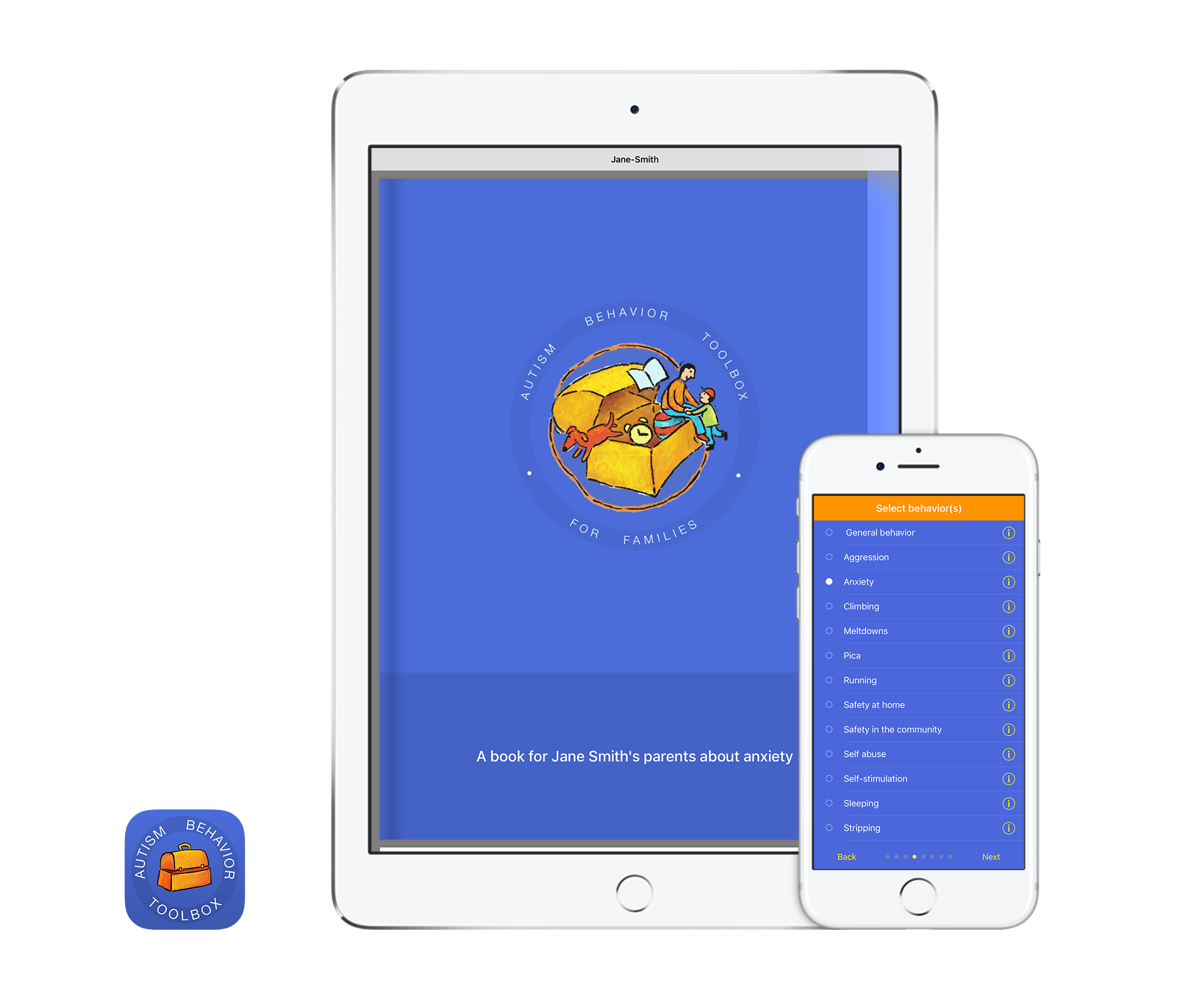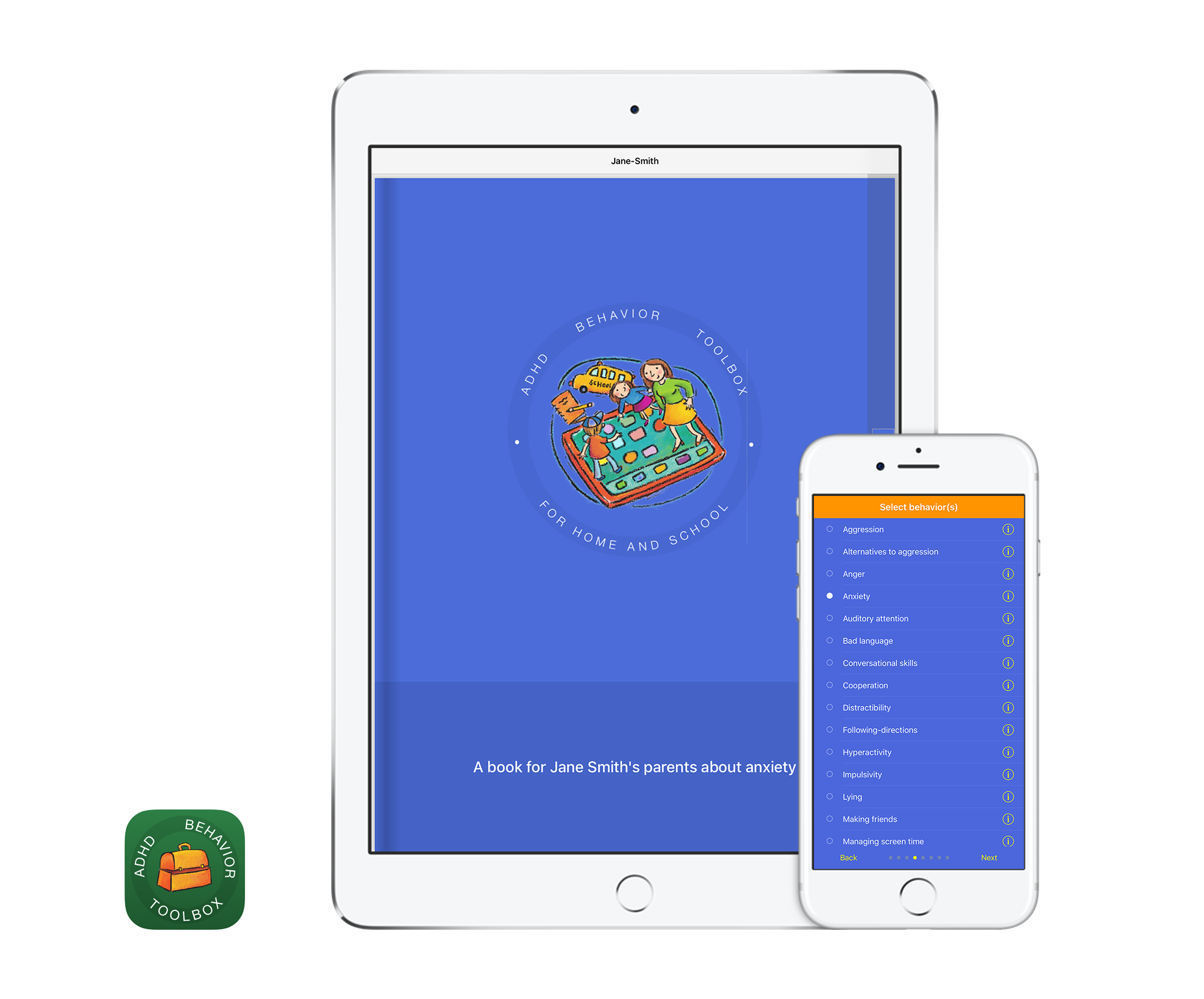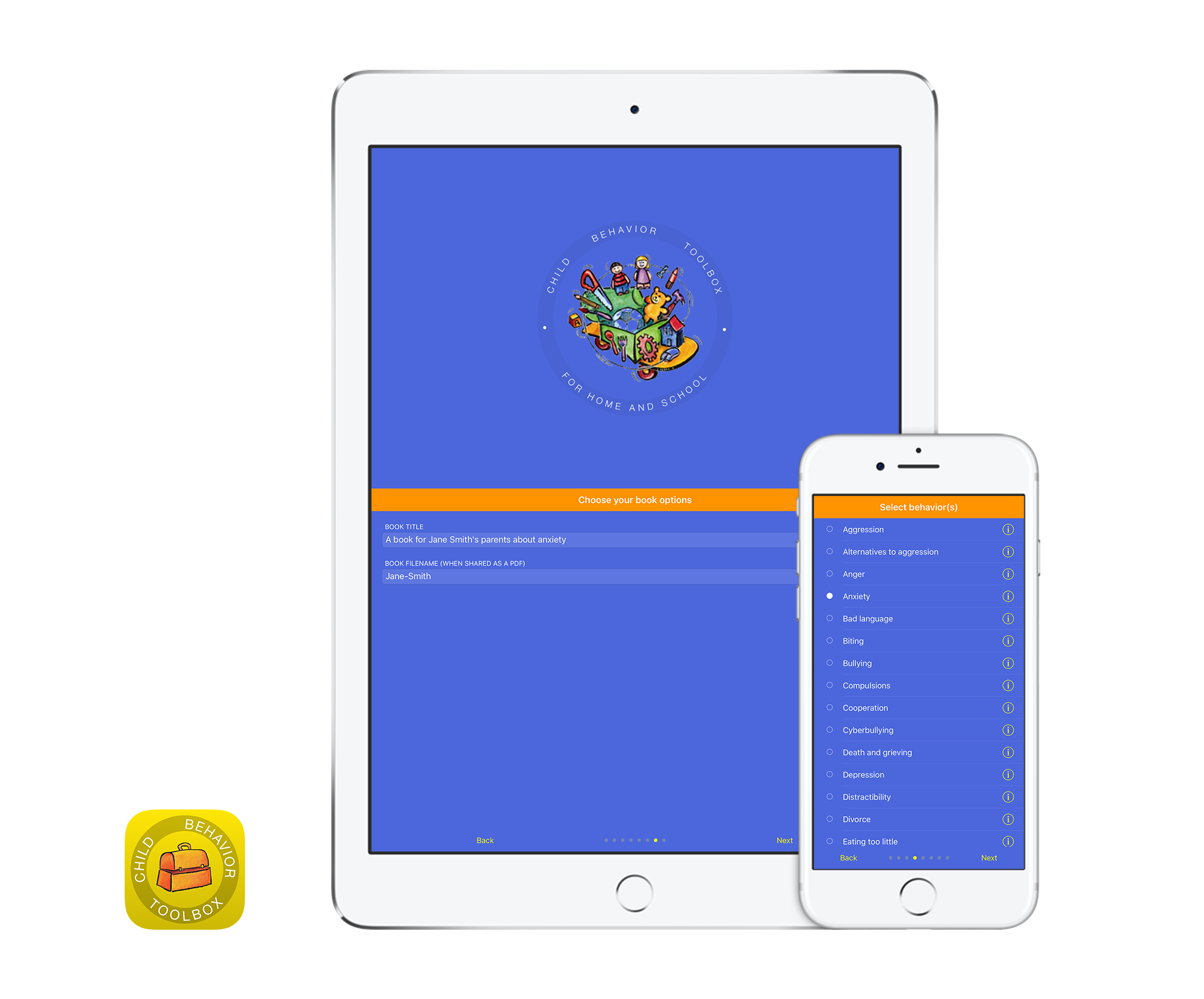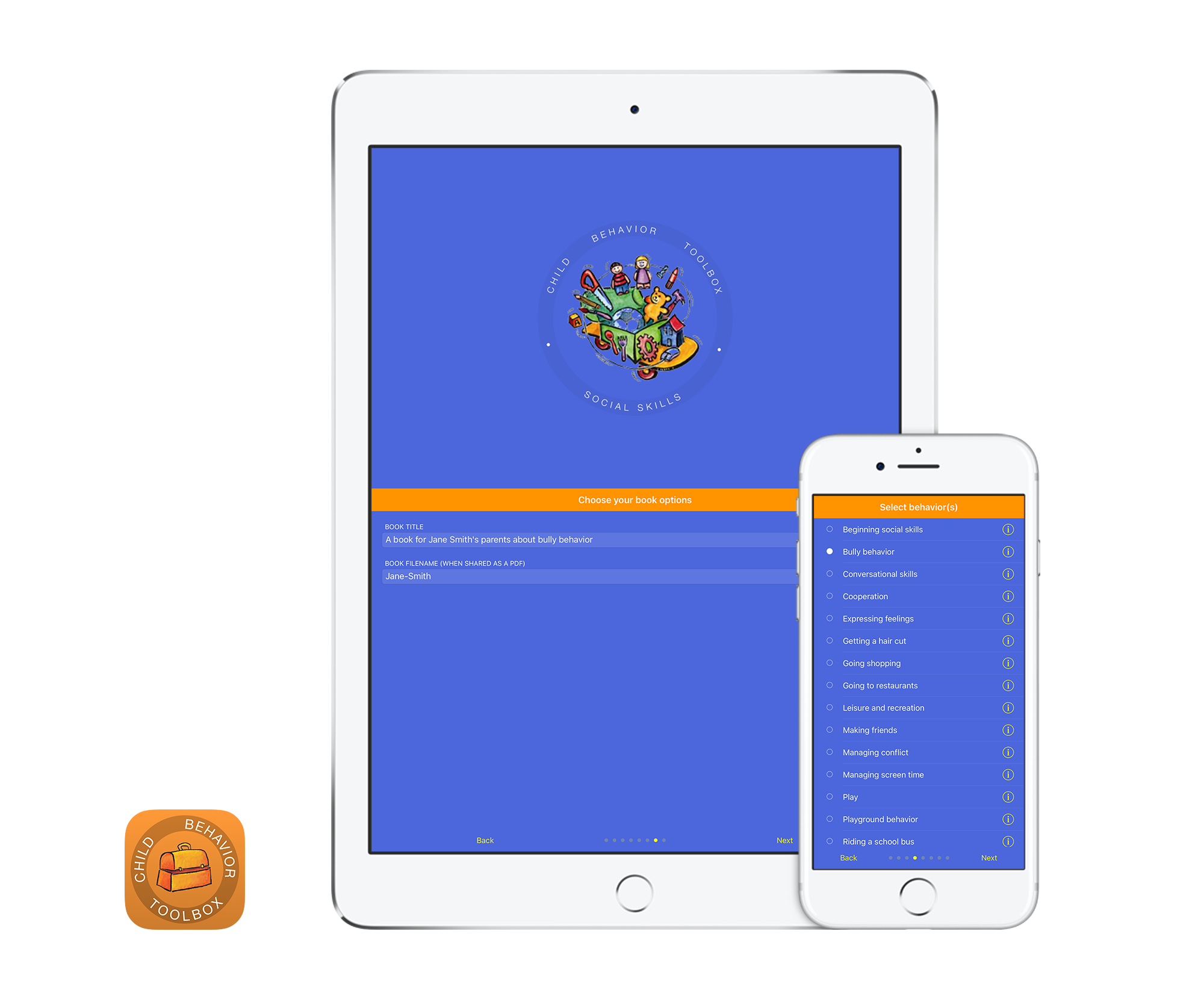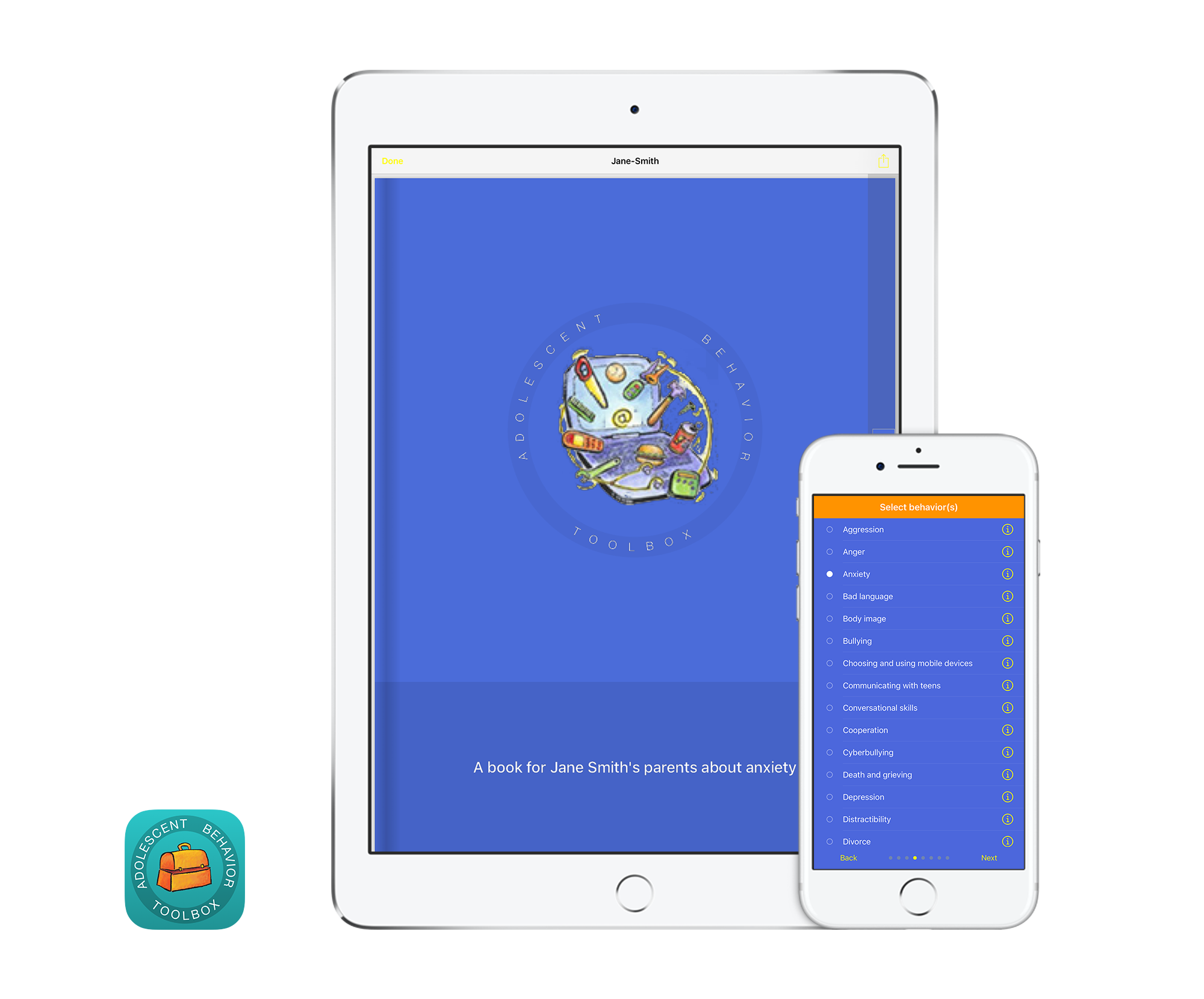Our Products
Online Web Based
Child Behavior Toolbox (CBT) – Infancy to 12 Years
The Child Behavior Toolbox is the longest standing edition of the series. The current edition supports professionals in education, mental health and healthcare. It covers a diverse range of behavioral concerns addressing 15 major subject areas. and 90 distinct behaviors. These are grouped according to age (Infants-age 2, ages 3-5, ages 5-8, and ages 9-12). Results can be tailored for use at home, preschool, school and in therapy.
- Aggression
- Alternatives to aggression
- Anger
- Anxiety
- Auditory attention
- Bad language
- Beginning social skills
- Biting
- Building language
- Bullying
- Bullying and teasing
- Choosing and using mobile devices
- Compulsions
- Conversational skills
- Cooperation
- Cyberbullying
- Dealing with excessive biting
- Death and grieving
- Depression
- Developing attachment
- Disability awareness
- Distractibility
- Divorce
- Early language development
- Eating concerns
- Eating too little
- Eating too much
- Encouraging exploratory play
- Encouraging healthy sleeping
- Expressing feelings
- Fears and phobias
- Fine Motor
- Following-directions
- Getting the most out of your mobile device
- Guidelines in the use of electronic games
- Guidelines in the use of social media
- Helping with homework
- Hyperactivity
- Impulsivity
- Inferential thinking
- Internet usage
- Lying
- Making friends
- Managing our electronic environments
- Managing pain
- Managing stress
- Memory games
- Memory strategies
- Memory tools
- Moving
- Nail biting
- Natural disasters
- Nonverbal problem solving
- Obsessions
- Obsessive compulsiveness
- Oppositional defiance
- Organization
- Play
- Playground behavior
- Promoting healthy nutrition
- Reading
- Refugee children
- Riding a school bus
- Selecting toys
- Selective attention
- Selective mutism
- Self-abuse
- Self-esteem
- Self-regulation
- Self-stimulation
- Sensation - Low arousal
- Sensation avoidance
- Sensation Seeking
- Sensation Sensitivity
- Sharing
- Shyness
- Sibling rivalry
- Sleeping
- Social problem solving
- Social skills for school
- Soiling
- Stealing
- Tantrums
- Teasing
- Terrorism and war
- Thumb sucking
- Toileting
- Verbal problem solving
- Victimization
- Violence
- Visual attention
- Visual motor
- Visual perception
- Wandering
- Wetting
- Working memory
- Worry
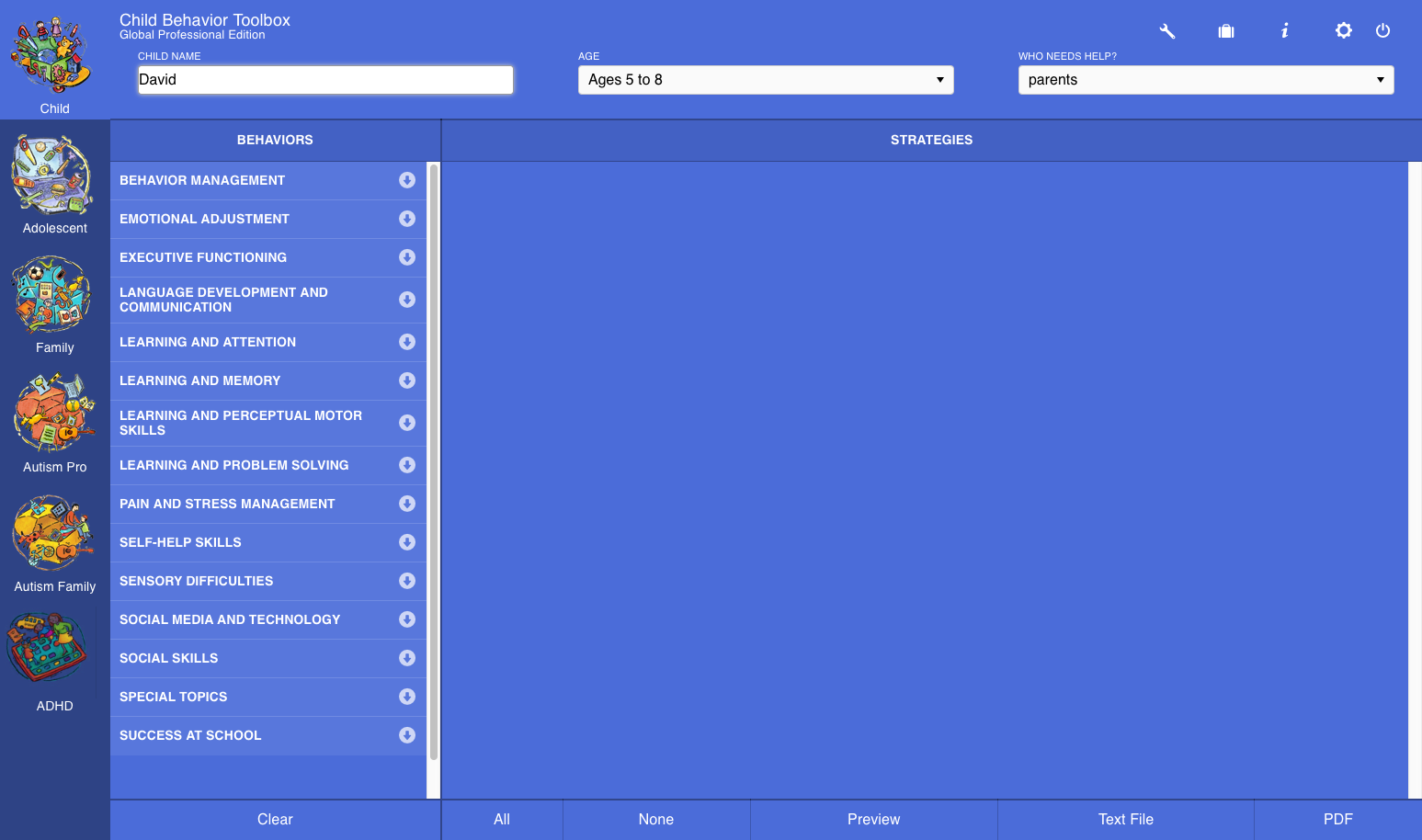
The Adolescent Behavior Toolbox (ABT)
The Adolescent Behavior Toolbox was developed to extend support for education and mental health professionals into the older age groups through to adulthood. It is a continuation of CBT but deals with the specific behaviors experienced in the 12 to 18 age group.
- Aggression
- Alternatives to aggression
- Anger
- Anxiety
- Auditory attention
- Bad language
- Body image
- Bullying
- Bullying and teasing
- Choosing and using mobile devices
- Communicating with teens
- Conversational skills
- Cooperation
- Cyberbullying
- Death and grieving
- Depression
- Distractibility
- Divorce
- Eating disorders
- Eating too much
- Expressing feelings
- Fears and phobias
- Going shopping
- Guidelines in the use of social media
- Hair-pulling
- Hyperactivity
- Hyperactivity/Impulsivity
- Improving adherence
- Improving nutrition
- Impulsivity
- Internet usage
- Lying
- Making friends
- Managing conflict
- Managing criticism
- Managing pain
- Managing stress
- Memory
- Moving
- Nail biting
- Natural disasters
- Nonverbal problem solving
- Obsessive compulsiveness
- Oppositional defiance
- Organization
- Peer pressure
- School attendance
- Selective attention
- Self-abuse
- Self-esteem
- Self-stimulation
- Sexuality
- Sibling rivalry
- Sleeping
- Social problem solving
- Stealing
- Substance abuse
- Suicidal indicators
- Suicide intervention
- Teasing
- Terrorism and war
- Transition to adulthood
- Verbal problem solving
- Victimization
- Violence
- Visual attention
- Working memory
- Worry
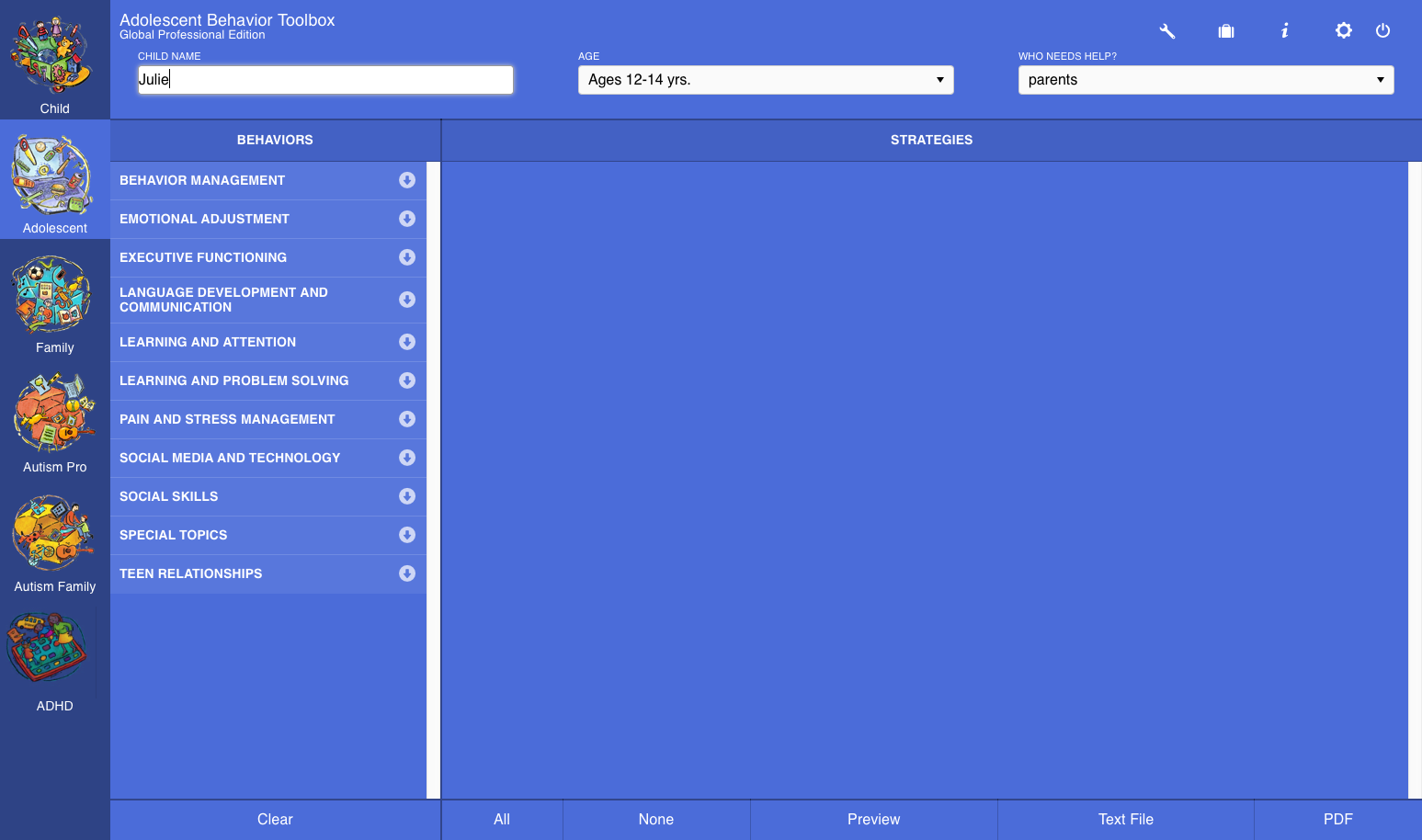
The Family Behavior Toolbox (FBT)
The Family Edition is intended for parents and family members who wish to deal with some of the behavioral challenges in raising children between the ages of 2 and 12. It covers 18 major subject areas including behavior management, emotional and social adjustment, executive functioning difficulties, language expression, language understanding, learning and attention, learning and memory, learning and perceptual motor skills, mobile and Internet issues, electronic games, pain and stress management, self-help skills, sensory difficulties, social skills, and special topics. Over the 18 major topic areas there are over 75 specific behavior and developmental concerns that are dealt with.
-
Aggression
- Alternatives to aggression
- Anger
- Anxiety
- Auditory attention
- Bad language
- Beginning social skills
- Biting
- Building language
- Bullying
- Choosing and using mobile devices
- Climbing
- Compulsions
- Conversational skills
- Cooperation
- Cyberbullying
- Dealing with excessive biting
- Dealing with problems of electronic game...
- Death and grieving
- Depression
- Disability awareness
- Distractibility
- Divorce
- Early language development
- Eating too little
- Eating too much
- Encouraging exploratory play
- Encouraging healthy sleeping
- Expressing feelings
- Fears and phobias
- Fine Motor
- Following-directions
- Getting the most out of your mobile device
- Guidelines in the use of electronic games
- Guidelines in the use of social media
- Helping with homework
- Hyperactivity
- Impulsivity
- Inferential thinking
- Internet usage
- Lying
- Making friends
- Managing our electronic environments
- Managing pain
- Managing stress
- Memory games
- Memory strategies
- Memory tools
- Moving
- Nail biting
- Natural disasters
- Nonverbal problem solving
- Obsessions
- Obsessive compulsiveness
- Oppositional defiance
- Organization
- Play
- Playground behavior
- Positive functions of electronic games
- Promoting healthy nutrition
- Reading
- Receptive communication
- Refugee children
- Riding a school bus
- Safety at home
- Safety in the community
- Selecting toys
- Selective attention
- Selective mutism
- Self-abuse
- Self-esteem
- Self-regulation
- Self-stimulation
- Sensation - Low arousal
- Sensation avoidance
- Sensation Seeking
- Sensation Sensitivity
- Sharing
- Shyness
- Sibling rivalry
- Sleeping
- Social problem solving
- Social skills for school
- Soiling
- Stealing
- Tantrums
- Teasing
- Terrorism and war
- Thumb sucking
- Toileting
- Verbal problem solving
- Victimization
- Violence
- Visual attention
- Visual motor
- Visual perception
- Wetting
- Working memory
- Worry
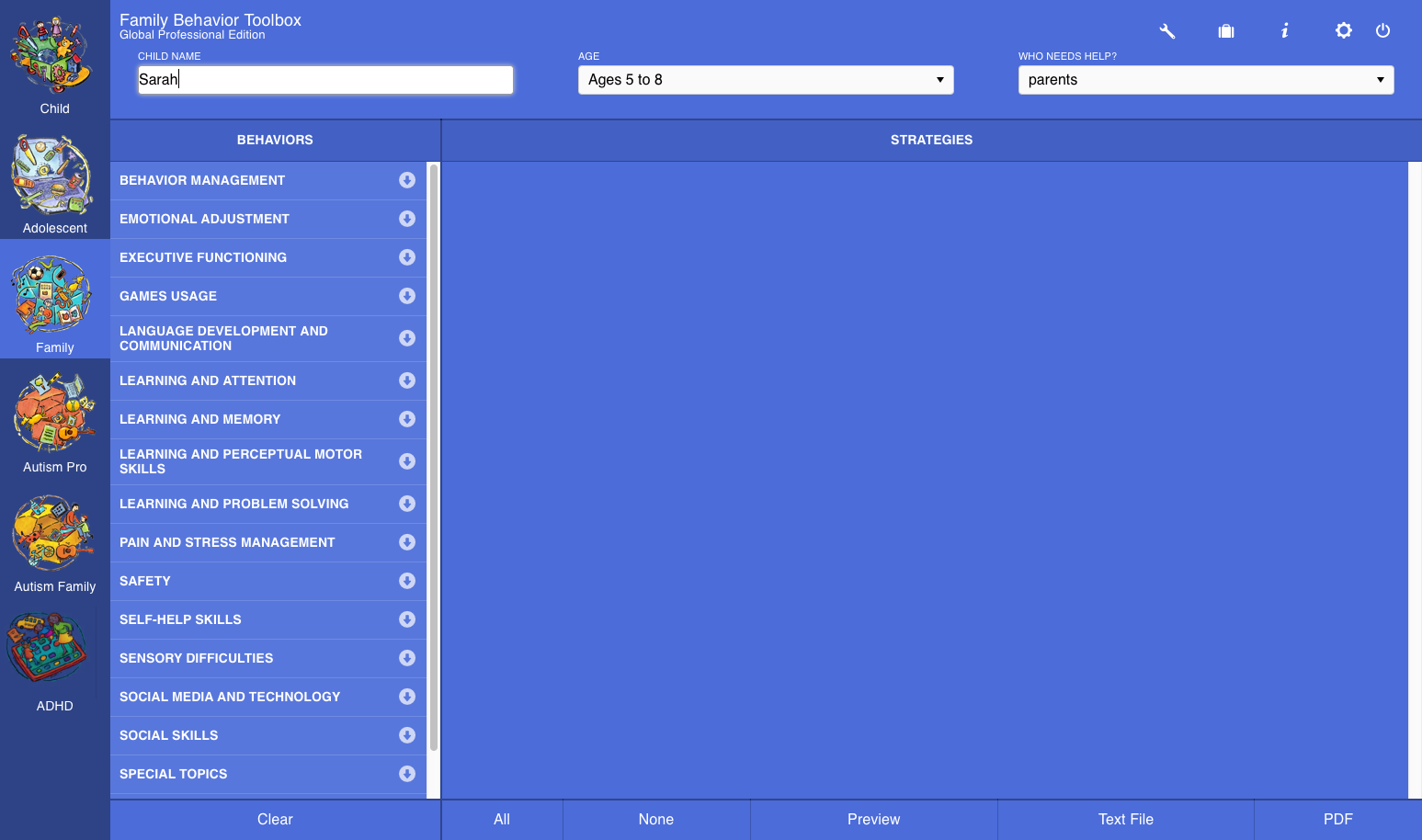
The Autism Behavior Toolbox
Autism Behavior Toolbox is a specialist edition providing professionals with intervention strategies to support children with Autism Spectrum Disorders and their families.
- Academic accommodations
- Aggression (physical)
- Aggression (verbal)
- Alternatives to aggression
- Anxiety
- Arranging the environment
- Arranging your home environment
- Auditory attention
- Augmentative and alternative communication
- Beginning social skills
- Building language
- Bullying and teasing
- Climbing
- Comprehension
- Conversational skills
- Cooperation
- Depression
- Distractibility
- Establishing homework routines
- Expressing feelings
- Following-directions
- General behavioral tips
- General guidelines for improving behavior...
- General teaching tips
- Generalizing meaning
- Getting a hair cut
- Going shopping
- Going to restaurants
- Hyperactivity
- Improving memory
- Impulsivity
- Inferential thinking
- Joint attention
- Leisure and recreation
- Making friends
- Making transitions
- Medication
- Meltdowns
- Memory games
- Memory strategies
- Memory tools
- Motivators
- Nonverbal problem solving
- Organization
- Pica
- Play
- Playground behavior
- Problems communicating in different...
- Reading
- Recess and lunch breaks
- Repetitive behavior
- Riding a school bus
- Riding in the car
- Running
- Safety at home
- Safety at school
- Safety in the community
- Selective attention
- Self-abuse
- Self-regulation
- Self-stimulation
- Sensation - Low arousal
- Sensation avoidance
- Sensation Seeking
- Sensation Sensitivity
- Sharing
- Sibling rivalry
- Sleeping
- Social pragmatics
- Social problem solving
- Social rule deficits
- Social skills for school
- Stripping
- Tantrums
- Teaching the non-verbal child
- Teasing
- Traveling and vacations
- Verbal problem solving
- Visiting the dentist
- Visiting the doctor
- Visual attention
- Visual motor
- Visual perception
- Wandering
- Working memory
- Working together as a family
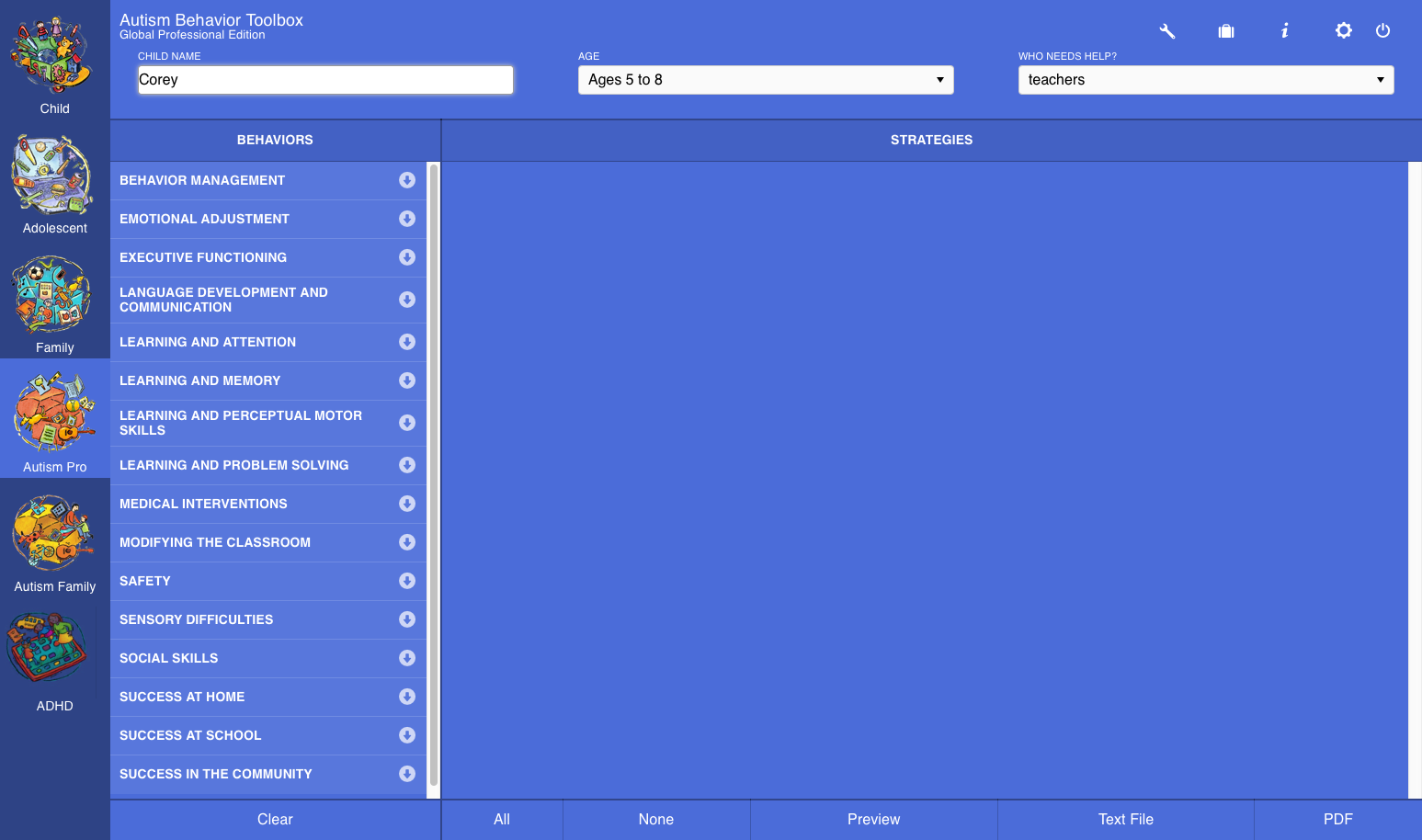
The Autism Family Behavior Toolbox
The Autism Family Behavior Toolbox was developed to provide families with very practical and proven strategies. Similar to our professional version, the focus of this Toolbox Edition is on promoting positive behavior, eliminating or reducing behavior that is harmful to the child and to others, teaching more appropriate ways of having their needs met, and building on present strengths.
- Aggression (physical)
- Aggression (verbal)
- Alternatives to aggression
- Anxiety
- Arranging your home environment
- Auditory attention
- Augmentative and alternative communication
- Beginning social skills
- Building language
- Bullying and teasing
- Climbing
- Comprehension
- Conversational skills
- Cooperation
- Depression
- Distractibility
- Establishing homework routines
- Expressing feelings
- Following-directions
- General behavioral tips
- General guidelines for improving behavior...
- General teaching tips
- Generalizing meaning
- Getting a hair cut
- Going shopping
- Going to restaurants
- Homework
- Hyperactivity
- Improving memory
- Impulsivity
- Inferential thinking
- Joint attention
- Leisure and recreation
- Making friends
- Making transitions
- Medication
- Meltdowns
- Memory games
- Memory strategies
- Memory tools
- Motivational tips for home
- Nonverbal problem solving
- Organization
- Pica
- Play
- Playground behavior
- Problems communicating in different...
- Reading
- Recess and lunch breaks
- Repetitive behavior
- Riding a school bus
- Riding in the car
- Running
- Safety at home
- Safety in the community
- Selective attention
- Self-abuse
- Self-regulation
- Self-stimulation
- Sensation - Low arousal
- Sensation avoidance
- Sensation Seeking
- Sensation Sensitivity
- Sharing
- Sibling relationships
- Sibling rivalry
- Sleeping
- Social problem solving
- Social skills for school
- Stripping
- Tantrums
- Teasing
- Traveling and vacations
- Verbal problem solving
- Visiting the dentist
- Visiting the doctor
- Visual attention
- Visual motor
- Visual perception
- Wandering
- Working memory
- Working together as a family
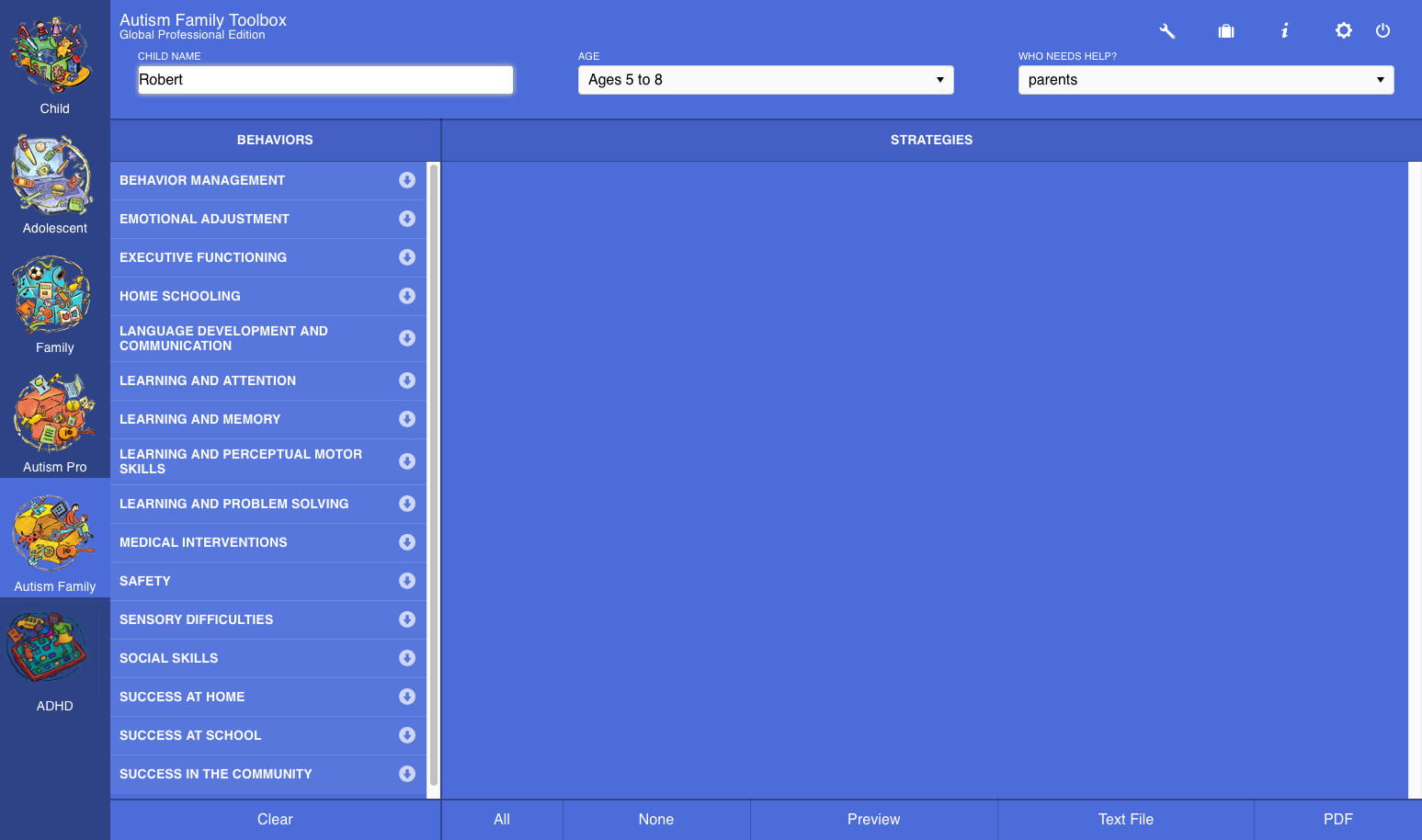
The ADHD Behavior Toolbox
The Attention Deficit and Hyperactivity Deficit Toolbox is our latest and newest product that was developed at the request of a group of community professionals. It consists of 10 categories of behavioral and developmental issues targeting over 50 specific concerns. It is designed for professionals and parents.
- Aggression
- Alternatives to aggression
- Anger
- Anxiety
- Auditory attention
- Bad language
- Beginning social skills
- Building language
- Bullying
- Conversational skills
- Cooperation
- Depression
- Distractibility
- Expressing feelings
- Fears and phobias
- Fine Motor
- Following-directions
- Hyperactivity
- Impulsivity
- Inferential thinking
- Lying
- Making friends
- Medication
- Memory games
- Memory strategies
- Memory tools
- Nonverbal problem solving
- Oppositional defiance
- Organization
- Reading
- Selective attention
- Self-regulation
- Sibling rivalry
- Sleeping
- Social problem solving
- Social skills for school
- Stealing
- Tantrums
- Verbal problem solving
- Victimization
- Visual attention
- Visual motor
- Visual perception
- Working memory
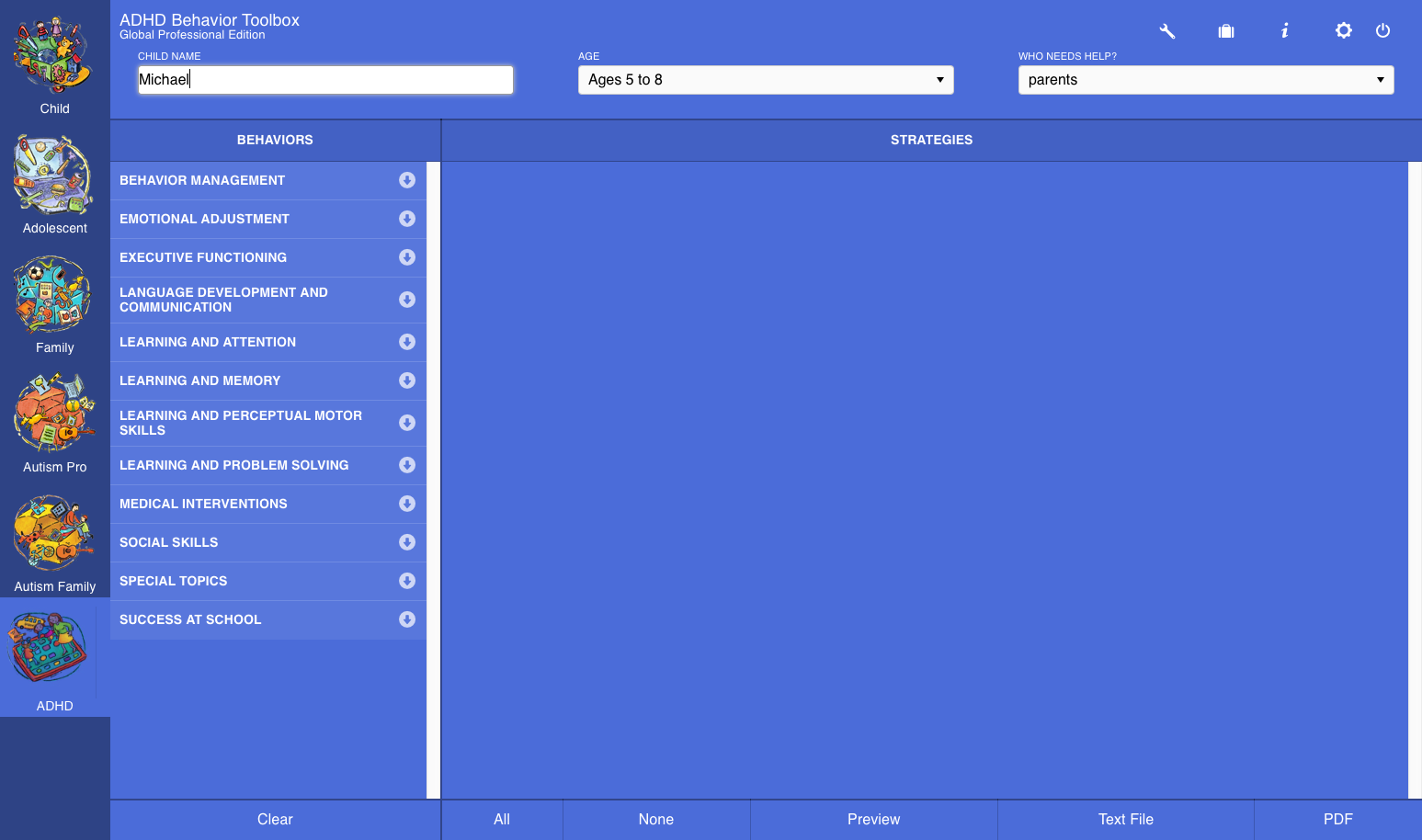
For a printable version of this product information, download our Product Information Document (PDF).
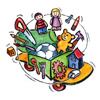 Child
Child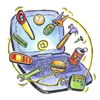 Adolescent
Adolescent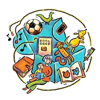 Family
Family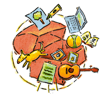 Autism Pro
Autism Pro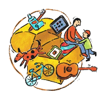 Autism Family
Autism Family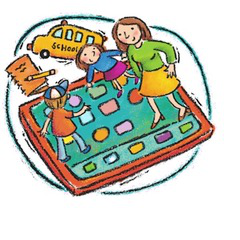 ADHD
ADHD